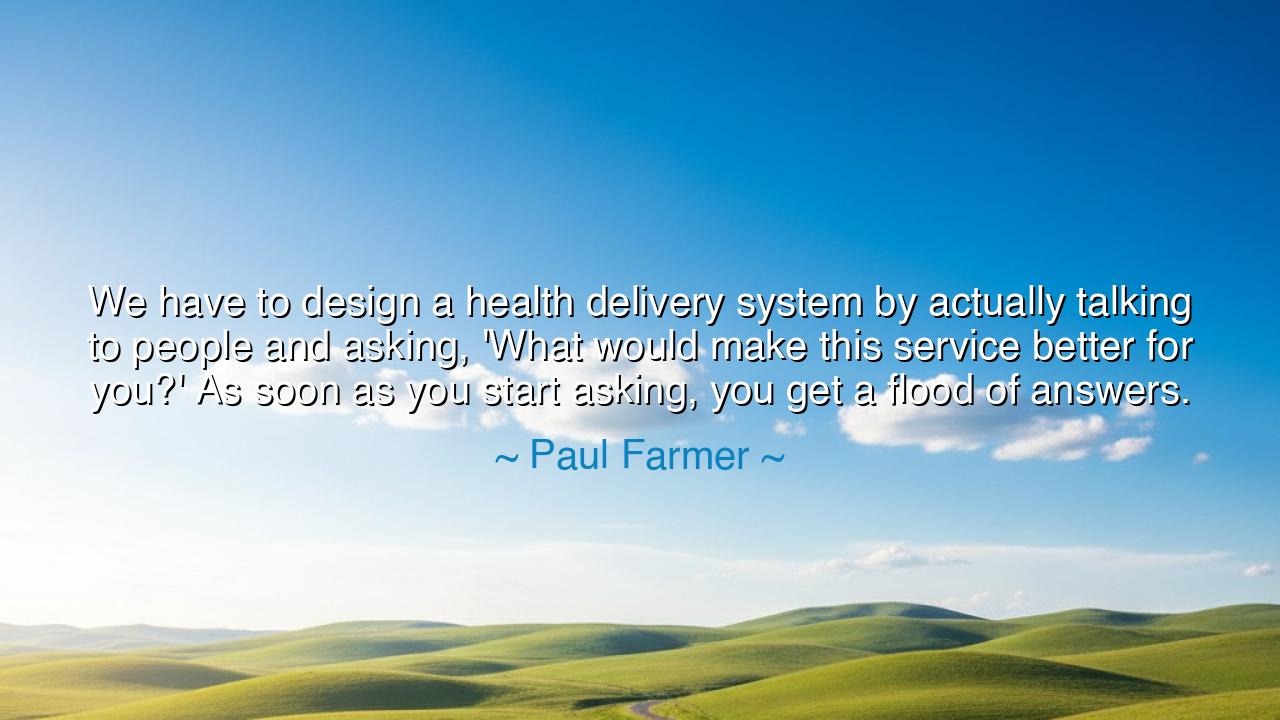
We have to design a health delivery system by actually talking to
We have to design a health delivery system by actually talking to people and asking, 'What would make this service better for you?' As soon as you start asking, you get a flood of answers.






In the compassionate and unyielding voice of a healer who saw beyond the walls of hospitals, Paul Farmer, the physician and humanitarian, once declared: “We have to design a health delivery system by actually talking to people and asking, ‘What would make this service better for you?’ As soon as you start asking, you get a flood of answers.” These words are more than a call for reform; they are a manifesto of empathy, a reminder that medicine is not a structure of stone and steel, but a covenant between human beings. In Farmer’s eyes, healing was not simply the act of treating the body—it was the art of listening to the soul. His words reveal a truth older than any science: that to serve humanity, one must first understand it.
The origin of this quote lies in Farmer’s lifelong mission to bring health and dignity to the world’s poorest communities. Born in 1959, he rose from humble beginnings to become a physician of global vision, co-founding the organization Partners In Health, which transformed care in places like Haiti, Rwanda, and Peru. Farmer was no distant theorist. He walked the mountain paths to reach the sick. He sat on the floors of mud huts to listen to their stories. He saw that health care designed from the top down often failed because it was built without the voices of the people it aimed to serve. So he turned the question inward and outward at once: not “How do we treat disease?” but “How do we serve people?” From this question flowed the wisdom of his quote, an insight both revolutionary and profoundly human.
Farmer’s teaching echoes the ancient principle of humility in leadership. The wisest rulers of old—the philosopher-kings of Greece, the just emperors of China, the tribal elders of Africa—understood that power divorced from the people becomes blindness. So too in medicine and design: to act without listening is to build in ignorance. Farmer saw that the answers to the world’s greatest health problems were not hidden in laboratories or universities, but already known in the hearts of those who suffered most. Ask a mother in Haiti what she needs, and she will speak of clean water, of a clinic that respects her dignity, of medicine that reaches her children in time. Ask a farmer in Rwanda, and he will tell you that health begins with food, with community, with hope. In their answers lies not complaint, but the blueprint of justice.
The ancients would have seen in Farmer’s approach the spirit of the healer-sage, one who serves by listening. Like Hippocrates, who walked among the sick to understand their lives before prescribing a cure, Farmer believed that healing could not be separated from understanding. He did not see patients as cases, but as people—with histories, families, and dreams. When he said that asking questions brings “a flood of answers,” he meant that people long to be heard, to share the wisdom born of their own survival. The healer who listens not only cures disease but restores dignity, transforming medicine from a science of the body into a ministry of the heart.
Consider a moment from Farmer’s own life in Haiti. In the village of Cange, high in the mountains, he found families suffering from tuberculosis. The conventional wisdom of global health at the time said that treating such diseases in poor communities was too costly, too complex. But Farmer sat with his patients, listened to their struggles, and designed a system around their needs: free treatment, food for their families, community workers trained to deliver medicine and encouragement. Within years, the epidemic waned. What global experts called impossible became reality because one man chose to listen instead of command. The miracle of Cange was not technology—it was humility made powerful.
And yet, Farmer’s words reach beyond medicine; they speak to every field of human endeavor. Whether in business, governance, education, or art, his message is the same: true design begins with listening. A leader who does not ask will never know what the people need. An artist who does not observe will never create truth. A teacher who does not hear their students will never ignite understanding. The flood of answers Farmer describes is the awakening of collaboration—the moment when creation ceases to be an act of imposition and becomes one of communion.
So let this be the lesson carried forward like a torch: to serve, first listen; to lead, first learn; to build, first ask. Speak not for others until you have heard their stories. When you design—be it a system, a service, or a dream—build it upon the foundation of empathy. For the wisdom of the world does not dwell only in the minds of the powerful, but in the lived experience of the humble. This was Paul Farmer’s legacy: that the path to healing—whether of the body, the society, or the world—begins not with command, but with conversation. And if we listen deeply, as he did, we too shall find that every person carries within them a piece of the cure the world so desperately seeks.






AAdministratorAdministrator
Welcome, honored guests. Please leave a comment, we will respond soon